Introduction
Yemen’s population of around 30 million is over 99 percent Muslim, with about one-third of Yemenis belonging to the Zaidi Shia sect and two-thirds belonging to the Shafa’i school of Sunni Islam. Nevertheless, minorities of Jews, Christians, Hindus, and Baha’is have lived in Yemen for hundreds or in some cases even thousands of years. While historically there was never any widespread sense of equality between Muslims and religious minorities, the latter were considered part of the national-religious landscape for the most part and there were boundaries to the discrimination against them.* However, since 2014, when the Houthis conquered territory containing over two-thirds of Yemen’s population, they have subjected religious minorities to relentless abuse based on a radical and intolerant ideology.
This report focuses on two particular religious minorities in Yemen:
- The Baha’is in Yemen number approximately 2,000, and they are subject to abuse at the hands of the Houthis.* In policies that echo those of the Islamic Republic of Iran, Baha’is in Yemen are placed on blacklists that bar them from employment, their bank accounts are blocked,* and they are subject to arbitrary detention and sham trials.
- Yemen’s Jews have lived in the country for over two thousand years, and by the middle of the 20th century their population exceeded 50,000. However, by 2016, their numbers had dwindled to between several hundred* to a few thousand.* Of those who remained, nearly all have since fled the country to escape relentless Houthi persecution. There are now fewer than 10 Jews believed to remain in Yemen, one of them being Libi Marhabi who has been languishing in a Houthi prison since 2016.*
This report aims to shed light on the mechanics of the Houthis’ oppressive policies in a number of realms: harassment, detention, persecution by the Houthi legal system, and confiscation of assets. The following two sections identify these individuals and their roles in the systematic targeting of religious minorities in Yemen:
- Judge Khaled al-Mawari(القاضي خالد الماوري)
- Judge Abdo Ismail Rajeh(القاضي عبده إسماعيل راجح)
- Judge Rajeh Zayed(القاضي راجح زايد)
- Judge Mohammed al-Dailami(القاضي الدكتور محمد الديلمي)
- Motlaq Amer al-Marrani, “Abu Emad” (مطلق عامر المراني, ״أبو عماد״)
- Brigadier General Muhammad al-Qahoum (العميد محمد القحوم )
- Tawfiq al-Hamiri(توفيق الحميري)
The final section will summarize the findings and identify precedents for U.S. sanctioning of similar activities.
Persecution of Baha’is
The Baha’is have lived in Yemen since shortly after the religion’s inception in the 19th century. Since 1970, the majority of the Yemeni Baha’i community live in the country’s north since they fled religious persecution of the People's Democratic Republic of Yemen (PDRY) in South Yemen. The religious community has been active in providing social services to coreligionists within Yemen as well as the country’s marginalized. Under the reign of Ali Abdullah Saleh, following Yemen’s unification, the Baha’is were not considered equals under the law but also had few run-ins with the government of Yemen in light of their religious obligation to avoid the political arena. One incident that stands out was the arrest of several Baha’i community members in 2008 under suspicion that they were Iranian operatives, but this was cleared up within a few months and the detainees were released unharmed.
Current estimates of the size of the Baha’i community in Yemen place it around 2,000 members as of 2016.* Many community members are native-born Yemenis who were born to Baha’i parents or who themselves converted. One of the ironies of the Houthis’ harassment and persecution of Baha’is is that it has prompted Yemenis to take greater interest in the faith.* In particular, the principles of pacifism and absolute gender equality resonate with progressive Yemenis who are living in an extremely conservative male-dominated society amidst a civil war that has fragmented the country.
Houthi persecution of Baha’is spans from the general to the personal. The group incites against Baha’is as satanic agents of the U.S. and Israel,* denies them professional opportunities,* and infringes on their right to practice their religion.* According to radical readings of Islamic law, as enforced by the Houthis, those who have converted from Islam to Baha’i can be charged with apostasy which is punishable by death.* The Houthis have also launched a concerted effort to target Baha’i community leaders with arbitrary detention, abuse in Houthi prisons, sham trials which result in severe sentences, confiscation of assets, and forced deportation.*
While there is an undeniable link between the Islamic Republic of Iran and the Houthis of Yemen, the exact contours of this relationship remain opaque. It certainly seems reasonable that the religious repression facing Baha’is under both regimes is indicative of the former’s influence over the latter. In fact, Yemeni Baha’i Nadim Sakkaf noted that during his 2016 detention his captors told him that they had been trained in Iran.*
Most recently, the Houthis have detained around 17 members of the Baha’i community at a gathering in May 2023, and their status and whereabouts remain unknown at the time of writing. While there are many instances of Houthi abuses of Baha’is in Yemen, for the purpose of understanding the mechanics of their systematic attacks on the community, this section will focus on two cases. The intertwined cases of Hamid bin Haydara and Wael al-Ariqi will be used as examples to identify key actors in overseeing and carrying out these abuses.
Hamid bin Haydara
Hamid bin Haydara was born in 1964 to Iranian immigrant parents on the south Yemeni archipelago of Socotra.* Haydara’s father served as a doctor to a south Yemeni sultan, and then his family fled the islands in 1967 after the sultanate’s fall and the establishment of the PDRY.* They left for the UAE where they became naturalized citizens, and Haydara eventually returned to Yemen after unification in 1991.* He settled down permanently in Socotra in 1997, where he worked as an engineer.*
Haydara was initially arrested in 2013 by Yemen’s National Security Bureau, and he would languish in a Sanaa prison for another seven years. Initially arrested because Islamist elements in the Hadi government were suspicious of Baha’is, for almost one year Haydara was subjected to solitary confinement, torture, attempts to extract false confessions, and accusations that he was an Iranian national cooperating with Israel.* When the Houthis took control of Sanaa, at first, they indicated that they viewed the previous government’s charges against Haydara as baseless.
However, this initial sense that Haydara’s fortunes would improve under the Houthis was soon dispelled. After another four years in detention, in 2018, Haydara was sentenced to death and the Houthis confiscated all of his property.* Samah Subay who was present during the court proceedings noted that those involved in the show trial against Haydara acknowledged that there was little substance behind the conviction and sentencing when they broke the fourth wall:
The judge kept asking the prosecution to provide proof of their claims, but no evidence was presented. Subay noted that, during the session in which Bin Haydara was sentenced to death, a member of the prosecution said that the case was political and that, even if a death penalty were issued, a political pardon would be granted. The judge reportedly said the same thing before sentencing Bin Haydara.*
Despite the acknowledged farcical trial, the judge ordered the arrest of Haydara’s family, who went into hiding, fled to Aden, and ultimately received asylum in Europe.* For the next two years, Haydara appealed his sentence, which was ultimately upheld by the courts in March 2020. However, shortly after the final ruling, Houthi President Mahdi al-Mashat supposedly pardoned Baha’i prisoners on the condition that they leave the country immediately. Haydara complied in order to avoid execution, and he lives today in Luxembourg. However, the prosecution continued to uphold the verdicts of the Baha’i defendants in absentia even after their supposed pardon, based on the claim that they had escaped or been released rather than pardoned.* Presumably this is to justify the Houthis’ continued seizure of the prisoners’ assets even after the latter departed from Yemen. In practice, the assets of the Baha’i defendants had actually been confiscated before the courts issued verdicts, but the legal justification for doing so was the guilty verdict and therefore elements within the Houthi regime had a strong interest in upholding the court’s ruling.*
The official responsible for Haydara’s initial arrest in 2013,Judge Khaled al-Mawari(القاضي خالد الماوري),serves today as the Houthis’ Deputy President of the Supreme Court*. The arrest took place before the Houthis took Sanaa and so this was during the period in which al-Mawari served the Saleh regime in a variety of positions, including public prosecutor. During that time, al-Mawari was hardly aligned with the Houthis and even prosecuted those responsible for procuring arms for the them.* Since 2014, he appears to have adjusted his positions and demonstrated sufficient loyalty to the Houthi regime to enable him to serve as Chief of Specialized Criminal Prosecution* and then Deputy President of the Supreme Court.
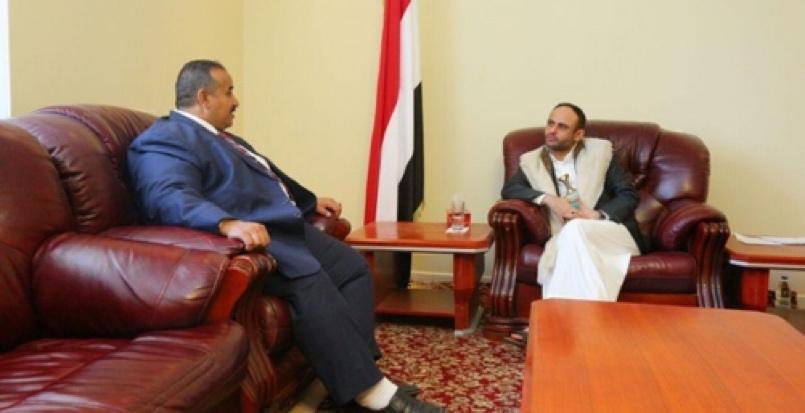
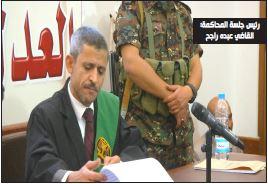
Left: Judge Khaled al-Mawari (left) sitting with Houthi President Mahdi al-Mashat (right) in 2019.*
Right: Judge Abdo Ismail Hassan Rajeh who sentenced Hamid bin Haydara to death.
The Houthi judge responsible for sentencing Haydara to death on January 2, 2018, was Judge Abdo Ismail Rajeh (القاضي عبده إسماعيل راجح). He also ordered the confiscation of Haydara’s property, the arrest of Haydara’s family, and the closure of all Baha’i institutions and forums in Yemen.* Since Haydara’s trial, Rajeh has continued to oversee the prosecution of additional members of the Baha’i community.* In addition to his role chairing trials for the Houthis’ Specialized Criminal Court (SCC) in Sanaa, Rajeh has also been appointed to the role of head of Investigation and Asset Recovery for the Supreme National Commission for Combating Corruption.
The Houthi official in charge of prosecuting Hamid bin Haydara was Judge Rajeh Zayed(القاضي راجح زايد).* According to several reports, Zayed took charge of prosecuting Baha’is in Yemen early on after the Houthi takeover of Sanaa, and he did so with great zeal.* A 2017 IranWire article quoted a Yemeni activist who explained Zayed’s strong interest in targeting Baha’is as a means to curry favor with Iran:
Zayed is Tehran’s man. This isn’t because of any particular revolutionary belief. Like many of the Houthi officials, it’s a power game and they are ready to go the extra mile for pleasing Tehran. And what pleases them more than suppressing the Baha’is? *
In a recent article published in the pro-Houthi outlet Saba.ye, Zayed was described as “a member of the Office of the Attorney General of Public Funds.”*
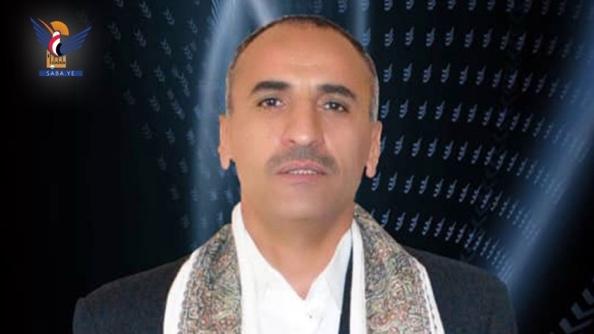
While this author was unable to locate any official photos ofJudge Rajeh Zayed, based on context as well as some digital clues there is a high likelihood that the above photo depicts him.*
Wael al-Ariqi
The case of Baha’i community member Wael al-Ariqi is documented in detail in an interview with al-Ariqi published by the news site Raseef 22.* Ironically, al-Ariqi was born into a Muslim family and only heard of the Baha’i faith after the 2013 arrest of Hamid bin Haydara, which sparked his interest and caused him to read about Baha’is on the Internet. After becoming involved in the community, al-Ariqi was first arrested in 2016 along with dozens of other Baha’is. He supposedly accepted the Baha’i faith while in Houthi captivity and was later granted conditional release. Al-Ariqi was then re-arrested in 2017 and remained in detention until 2020.
Al-Ariqi’s story, as recorded in Raseef 22, serves as a valuable tool to cross-reference the information regarding the detention and sham trials of al-Haydara. While the two were released together in 2020, their journeys through the Houthi justice system were separate, and yet two of the same key figures recur in al-Ariqi’s case.
Before his re-arrest in 2017, al-Ariqi was called in for questioning by prosecutor Rajeh Zayed. Zayed also allegedly issued the warrant to re-arrest al-Ariqi after the latter dispatched hired lawyers to appear before the prosecution in his stead, and Zayed threatened to arrest not only Baha’is but all of Yemeni civil society.* After being initially charged with espionage as well as collaborating with the U.S. and Israel, al-Ariqi had further charges added by Judge Abdo Ismail Hassan Rajeh.*
In addition, it is worth noting that Motlaq Amer al-Marrani (“Abu Emad”), who is already sanctioned by the U.S. Department of Treasury* for torture and mistreatment of detainees including humanitarian workers,* was also engaged in the repression of Baha’is. Al-Marrani previously served as the deputy director of the National Security Bureau and, after the Houthis reorganized their intelligence services, he took on the role of branch director in the Security and Intelligence Service.
According to al-Ariqi’s account, al-Marrani threatened to murder the Baha’i prisoners and plant weapons on them in order to frame them for partaking in a violent revolt. Al-Marrani was also responsible for setting the conditions of al-Ariqi’s initial release, which severely restricted the Baha’is’ ability to practice their religion.*
In 2022, the Supreme Council for the Management and Coordination of Humanitarian Affairs and International Cooperation (SCMCHA)* posted a photo of a briefing that included both Ralph Wehbe, the deputy head of the International Committee of the Red Cross (ICRC)’s delegation in Yemen, as well as al-Marrani. It is unclear whether Wehbe was aware that he participated in a meeting with a shadowy intelligence official who had been sanctioned by the U.S. for torturing humanitarian workers. Nonetheless, it is concerning that al-Marrani would be meeting with the ICRC regarding its humanitarian work in Yemen.
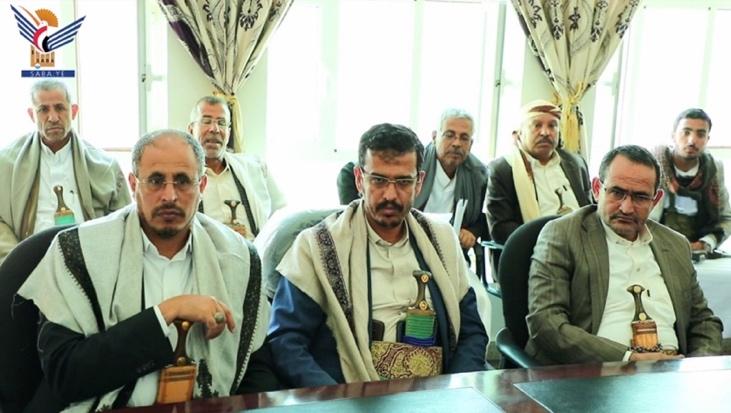
As there are no official photos of al-Marrani, facial recognition technology was used to identify him. It is highly likely that al-Marrani is the individual seated in the center of the first row.*
Persecution of Jews
The Houthis’ rise to power likely accelerated the 70-year-old trend of Jewish emigration from Yemen. However, the rate of decline of the Jewish population in Yemen is hard to gauge accurately due to the low profile the community maintains to avoid any additional threats from extremists seeking to harm its members. In 2016, the Israeli embassy in London celebrated the Jewish Agency’s assistance in rescuing around 200 Jewish Yemenis and noted that about 50 remained, “including approximately 40 in Sanaa, where they live in a closed compound adjacent to the U.S. embassy and enjoy the protection of Yemeni authorities.”* Since then, the reality has changed: the number of Jews remaining in Yemen has dwindled to the single digits and the few Yemeni Jews that remain do not enjoy the protection of the authorities in Sanaa.
That same 2016 post by the Israeli embassy in London noted, “The [recent Yemeni immigrants to Israel] included the community’s rabbi, who brought a Torah scroll believed to be between 500 and 600 years old.”* Bringing the Torah to Israel was a valiant step to preserve a religious and cultural artifact at risk from the Houthis, whether by accidental destruction in the conflict, intentional destruction to wipe out the country’s Jewish heritage, or smuggling and illicit sale on the black market in order to fund the Houthi war effort.* Unfortunately, however, bringing the scrolls to Israel led Houthis to press criminal charges against seven Yemenis for smuggling an ancient manuscript out of the country.
Those accused* of smuggling the ancient manuscript from Yemen to Israel include:
- Yahyah Suleiman Mosa Marhabi
- Yahyah Haroon Zandani
- Suleiman Yahyah Yaqoub
- Libi Salem Musa Marhabi
- Sameer Abdullah Nasser Shaiy’
- Ammar Ali Maknoon
- Col. Yahyah Ali Mohammed Al-Asm
The first four of those charged by the Houthis are members of the Jewish community alleged to have been involved in the smuggling, while the latter three are airport employees accused of assisting in the operation.* Information about the charges, detention, and trials is scant. In contrast to details about the trials of journalists or women targeted by the regime, Houthi media outlets have published next to nothing about the incident or the subsequent judicial process.
However, it is possible to collect enough information to piece together a coherent picture of the events as they transpired. Three of the four Jews charged in the smuggling operation (i.e., Yahyah Suleiman Mosa Marhabi, Yahyah Haroon Zandani, and Suleiman Yahyah Yaqoub) appear to no longer live in Yemen and likely emigrated from Yemen via the Jewish Agency in the 2016 operation or prior. They were still publicly requested to appear beforePublic Funds Court of Appeals* in 2018, but this was likely a legal formality to enable a conviction which would allow the Houthis to confiscate any assets they left behind.
The airport/customs employees (i.e., Sameer Abdullah Nasser Shaiy’, Ammar Ali Maknoon, and Col. Yahya Ali Mohammed al-Asm) were convicted by thePublic Funds Court in 2018. The most high-profile of the three was Col. Yahya al-Asm who served as director of operations at the Sanaa airport prior to his arrest.* All employees were found guilty of taking part in smuggling the manuscript, and Maknoon was also charged with forgery*—presumably of documents which facilitated the smuggling. The trio was sentenced to time-served in 2018, but their release was delayed until 2019.
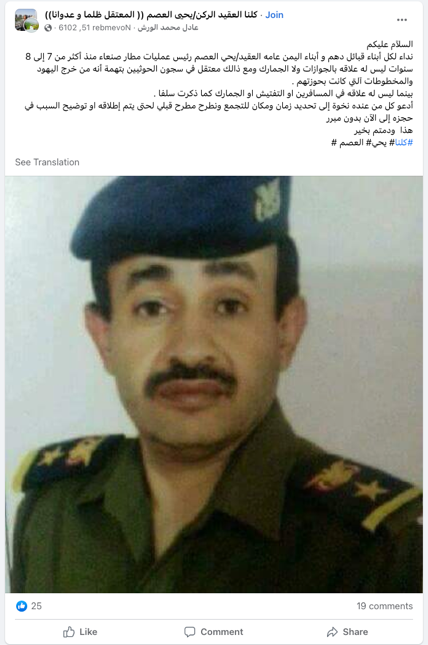
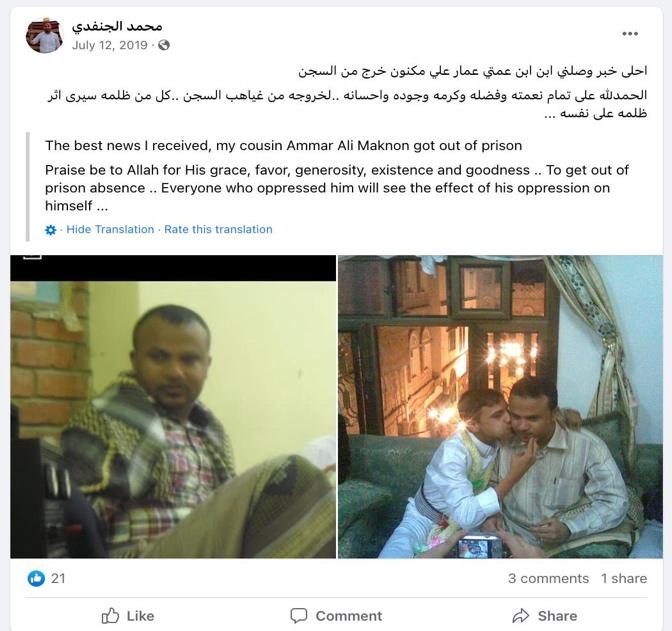
Left: A post in the Facebook group “we are all Col. Yahya al-Asm” opposing al-Asm’s detention for crimes related to the smuggled manuscript. Other posts in the group noted that the smuggling incident was merely a pretext for imprisoning Col. Al-Asm who opposed Houthi excesses. Right: A cousin of Ammar Maknoon celebrates his release in 2019.*
Finally, Libi Salem Musa Marhabi was tried and sentenced in 2018 alongside his alleged co-conspirators from the airport/customs case. In 2019, the judiciary sought to release Marhabi along with the others for time served (provided he could cover all the legal expenses). However, the Houthi national security apparatus intervened and prevented Marhabi’s release. According to one Yemeni activist/politician, thesenior Houthi intelligence official responsible for keeping Marhabi in prison was none other than Motlaq Amer al-Marrani (“Abu Emad”) who prevented the release on national security grounds. *
Yemeni human rights organization SAM for Rights and Liberties (SAMRL) noted that after completing his initial sentence for smuggling the manuscript, Marhabi was interrogated and then charged for working with Israel’s foreign and domestic intelligence agencies. He is likely in a Security and Intelligence Prison in Sanaa,* but SAMRL notes there is a complete media blackout, observing “there is no accurate information available about the fate of [Libi] and the status of his trial in the charge of working for the Israeli Mossad.”*
The Houthi intelligence services likely sought to take control of the Marhabi file from the judiciary by framing him for crimes against national security. It may have done so for a variety of reasons, including the belief that after taking control of the prisoner it would be possible to extract lucrative concessions for his release. It would otherwise appear odd timing for Houthi media to report that Marhabi’s ID was “found” at an enemy (i.e., coalition) facility only days after Marhabi’s conviction. Houthi media played up this “discovery,” claiming that it was a smoking gun linking the Jews to the anti-Houthi coalition forces and proving that the two are cooperating.* By that point, Marhabi had already been languishing in Houthi prisons for years.
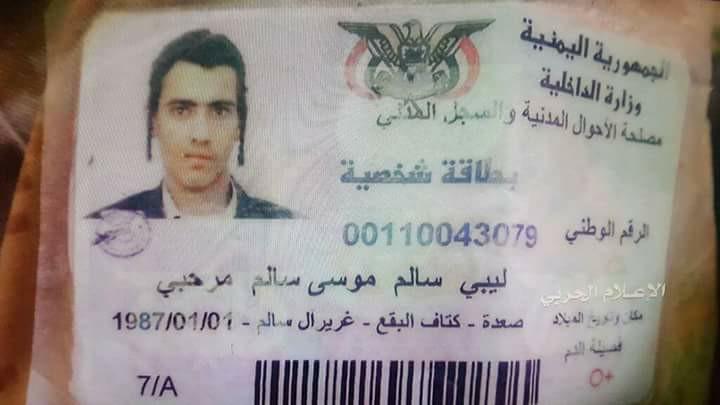
Marhabi’s ID card which Houthi media outlets claim was found in a coalition facility and proves Jewish-coalition collaboration against the Houthis.*
Tragically, as of the time of writing, Marhabi continues to languish in Houthi captivity. Marhabi has suffered tremendously since being detained by the Houthis in 2016. His family was not informed of his whereabouts for several months after his arrest, as his mother recounts that he was detained suddenly and without any prior warning on a routine errand to pick up the traditional Yemeni chew known asqat. His family was denied the right to visit him for his first two years of his confinement. While there are some reports that Marhabi’s wife was kidnapped by the Houthis and married off, more reliable sources note that she and Marhabi’s father have since died during his imprisonment.*
As for his physical well-being, the U.S. Commission on International Religious Freedom noted that Marhabi “suffers from kidney and lung issues and has lost all his teeth from being tortured repeatedly.”* Another account from someone informed of the situation observed, “Marhabi was tortured in prison, I was watching the effects of the fire on his body because he was electrocuted and beaten with cables, so he became partially blind, and signs of spinal cord injury appeared, so he began to lose mobility.”* Despite his declining health, Marhabi is denied access to proper medical care.
Those seeking to extort the Marhabi family by holding Libi hostage were exposed in an interview with Libi’s brother Haboub Salem Marhabi. Haboub recounted that the Marhabi family left Yemen because they were promised that this was the condition upon which his brother Libi, by now in failing health, would be released from Houthi captivity. Those who negotiated this “deal” with Haboub, in order to exploit Libi’s imprisonment to rid Yemen of its last few remaining Jews, are Mohammed al-Qahoumand and Tawfiq al-Hamiri.* Obviously, al-Qahoum and al-Hamiri did not hold up their end of the deal by releasing Libi once the Marhabi family had departed from Yemen.
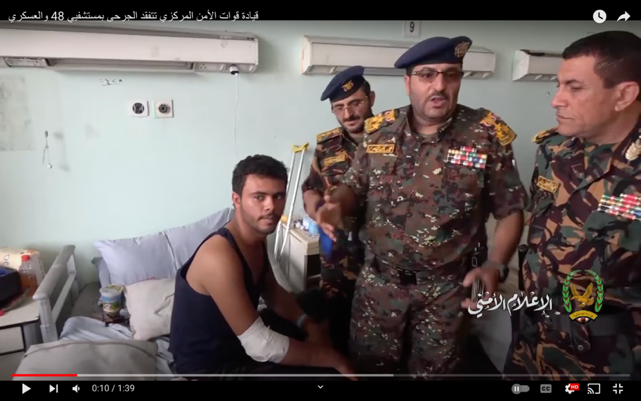
Brig. Gen. Muhammad al-Qahoum (second from right) visits injured Houthi fighters in a military hospital.*
Brigadier General Muhammad al-Qahoum (العميد محمد القحوم) serves the Houthi regime as chief of operations in the Central Security Forces (CSF). According to a Houthi announcement from 2016, “Central Security Forces were and will remain the solid stone by which all conspiracies and intrigues seeking to destabilize Yemen’s security and stability are shattered.”* This statement is indicative of the fact that the CSF are a domestic counter-intelligence (CI) organization and tasked with ensuring the survival of the regime. Given their CI portfolio, it makes sense that CSF would play a role in Marhabi’s detention during and after the regime’s framing of Marhabi for crimes against national security.
Tawfiq al-Hamiri(توفيق الحميري) serves in the Houthi regime as a member of the Supreme Revolutionary Committee and an advisor to the Ministry of Information. In his role as an advisor, he promotes the regime’s narrative through Yemeni media outlets* as well as global media outlets.* Before the Houthis’ rise to power, al-Hamiri was an anti-government journalist and activist who was himself detained and beaten by the previous regime.* His role in Marhabi’s detention is presumably from a media-related angle, and may be connected to how the story is framed and which foreign organizations ought to be approached in order to derive maximum benefit.
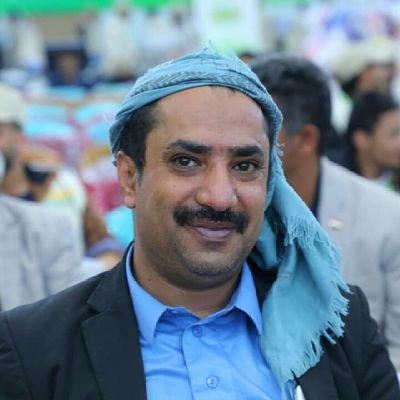
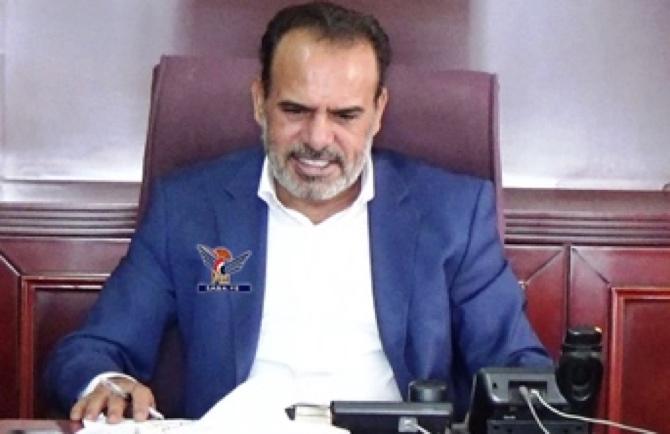
Left: Tawfiq al-Hamiri is a member of the Supreme Revolutionary Committee and an advisor to the Houthis’ Ministry of Information.* Right: Attorney General Mohammed al-Dailami oversees the prosecution of the accused in Yemen, and he dismissed efforts to push for Marhabi’s release.*
Judge Mohammed al-Dailami (القاضي الدكتور محمد الديلمي) serves as the Houthis’ Attorney General and previously served in other senior roles at the Ministry of Justice. He bears responsibility for Marhabi’s continued detention based on his authority over the ongoing and secretive prosecution of Marhabi and his refusal to intervene to stop the persecution of Marhabi which is based on conspiracy theories rather than legal regulation. Marhabi’s attorney Abdul Basit Ghazi recounts on Facebook that he confronted al-Dailami about the injustice being done to his client, and he asked al-Dailami to fulfill his duty as Attorney General and act in accordance with the law which mandated Marhabi’s release. Al-Dailami responded to this overture by saying, “no one would take care of a Jew except for another Jew.” This was both dismissive of the legal concerns as well as a veiled accusation, meaning if Ghazi cares so much about this Jewish prisoner, then he must be Jewish, too.
Conclusion
The previous sections identified individuals within the Houthi regime who sought to exploit the vulnerable position of religious minorities in Yemen to target them with harassment, detention, unfair trials, lengthy prison sentences, and confiscation of assets. Such individuals ought to be held to account for their actions as a means to promote justice for the victims as well as to avoid creating the impression that those who commit injustices in faraway places can act with impunity. There is also a great deal of precedent for the U.S. government to sanction individuals engaged in the types of discriminatory activities documented in this report, particularly in Iran.
This report has demonstrated that senior officials in the Houthi legal system are engaged in discriminatory practices against religious minorities, including Baha’is and Jews. In 2019, Iran’s Mohammad Moghisseh was sanctioned under Executive Order (E.O.) 13846 for engaging in such activities.* Moghisseh supervises Branch 28 of the Tehran Revolutionary Court, and the court over which he presides has, among other misdeeds, “pressed questionable charges against several members of Iran’s Baha’i religious minority, prosecuting them for supposed participation in activities such as propaganda against the state and assembly and collusion against national security.”* Individuals, such as Judge Rajeh Zayed, who exploit the Yemeni legal system to perpetrate similar injustices against Yemen’s Baha’i community ought to be sanctioned as well.
In addition, during Marhabi’s detention, he has been tortured to the point where he no longer has any teeth and has lost his mobility at the age of 35. In 2010, Iran’s Morality Police, Ministry of Intelligence and Security (MOIS), the Army’s Ground Forces, Basij Resistance Forces, and Law Enforcement Forces were sanctioned for “employing violence to suppress… members of the Iranian Baha’i community” which were rightly deemed as “serious human rights abuses against the Iranian people,” in accordance with E.O. 13553. * In the case of Iran, it was sanctionable to employ violence targeting religious minorities in general; in the case of Yemen, it would seem even more severe to employ violence against religious minorities while they are enduring an extended period of unjust detention.
Finally, Marhabi’s family was told by senior Houthi officials that the only way to secure Libi’s release would be for them to leave the country. In 2019, the head of the Iranian Supreme Leader’s Office, Mohammadi Golpayegani, was sanctioned for his role in the regime’s “systematic blocking of social and economic progress of the Baha’i community, a religious minority group in Iran. This includes expelling members of the Baha’i faith from universities and denying them employment.”* If it is sanctionable to expel members of religious minorities from universities or to deny them the right to work, it should certainly also be sanctionable to hold a religious minority hostage in order to force his family to leave the country under the false pretense that doing so will secure his release.
While the executive orders issued by U.S. presidents are used as a basis to sanction Iranian officials are, in some cases, specific to Iran, the standards of acceptable behavior should not be country specific. The 2016 Global Magnitsky Human Rights Accountability Act (the Magnitsky Act)* provides a framework to target those around the world engaged in human rights violations. It can and should serve as the framework to target the Houthi leaders responsible for the most egregious discriminatory practices.
 TOP
TOP